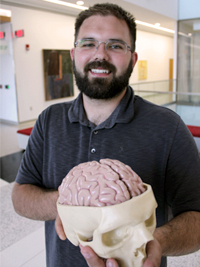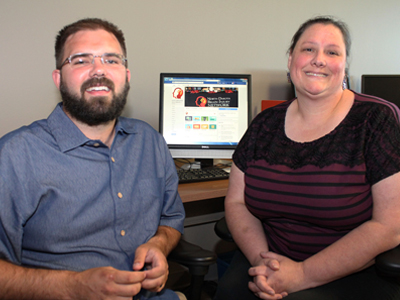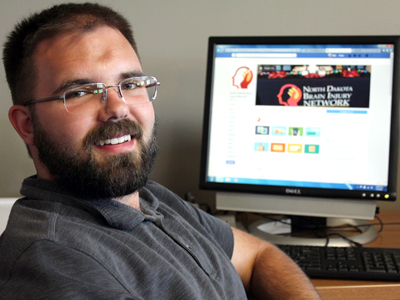Brain Injury Survivor Helps Others
By Marv Leier on
Matt White is an intern for the Center for Rural Health North Dakota Brain Injury Network (NDBIN). The Bismarck native is majoring in rehabilitation and human services with a minor in psychology at the University of North Dakota. Even though working closely with NDBIN falls right in line with his career goals, White's path actually began before NDBIN even existed.
The Headaches Start
White started to get headaches when he was 14 years old, just as he was beginning the 9th grade. At first, doctors didn't think they were anything serious.

"They thought I was having migraines from the school lights, so they prescribed Tylenol 3 and sent me home," said White.
But the headaches got worse. Doctors ordered a CT scan and determined he needed a craniotomy for drainage of a frontal intracranial abscess.
"It was essentially a sinus infection that ended up getting into my cranial cavity," said White.
They thought I was having migraines from the school lights, so they prescribed Tylenol 3 and sent me home.
Doctors removed portions of his skull to clear the infection and replaced them with metal plates to help White heal from his brain surgery.
The Road to Recovery
Doctors kept White in an induced coma for 30 hours to aid in his recovery, but shortly after waking him, they had him up and walking around. A few days later, White was discharged.
But recovering from a brain injury takes time and a team effort.
"I had a PICC line in my arm for nine months and received antibiotics through it three times a day," said White.
White worked with a variety of healthcare professionals including physical, occupational, and speech therapists.
The surgery left me unable to use certain facial muscles or even wiggle my ears because my incisions went from ear to ear.
"My speech had become slurred with a lot of mumbling and lack of enunciation. The surgery left me unable to use certain facial muscles or even wiggle my ears because my incisions went from ear to ear," he said.
White also credits his neighbors, who were retired teachers, for helping him stay on course. "They wanted to make sure I didn't fall behind or have to repeat a grade," said White.
A Perfect Fit

White's college advisor suggested he pursue an internship with NDBIN at the Center for Rural Health. She knew it would be the perfect fit for him, both personally and professionally.
"Matt is wonderful to work with and is incredibly humble and open to learning as much as he can," said Rebecca Quinn, NDBIN Program Director. "His past experiences have enhanced his education and allow him to have a deeper understanding about working with individuals dealing with a traumatic brain injury."
His past experiences have enhanced his education and allows him to have a deeper understanding about working with individuals dealing with traumatic brain injury.
White often accompanies Quinn when she conducts educational presentations on recognizing and diagnosing brain injuries. Quinn says White has developed brain injury learning guides for support groups in his short time at NDBIN and, when it comes to promoting the project through social media, White is the go-to guy.
Matt has an amazing attitude and perseverance.
"Matt has an amazing attitude and perseverance," Quinn said. "He is a testament that individuals can pursue higher education and find careers that matter to them. Matt has found a way to make his past experiences meaningful to his ongoing career goals."
Giving Back
White hopes that one day he'll be a Certified Rehabilitation Counselor. He hopes to turn his experience and his internship with the NDBIN into helping others who have gone through a life-altering event, such as a brain injury.

White believes it's important for everyone to be educated and aware when it comes to the brain. Don't be afraid to see a different doctor or request certain services if you feel something is not right.
"I had no symptoms of a sinus infection. I was simply given Tylenol 3 to get me through the school day because I had migraines from the school lights," said White.
White also offers this advice: "Whether it's wearing a helmet, or recognizing the signs that something is not right with your head, always protect your noggin."


 was formerly the Communications Manager at the Center for Rural Health at the University of North Dakota (UND) School of Medicine & Health Sciences in Grand Forks.
was formerly the Communications Manager at the Center for Rural Health at the University of North Dakota (UND) School of Medicine & Health Sciences in Grand Forks.



